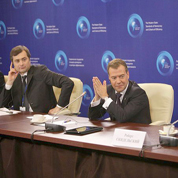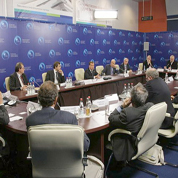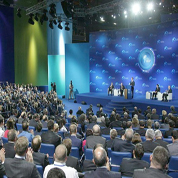Kremlin outlines five criteria for ‘a bonafide democracy’ for the 21st century

Confronting his international critics labeling Russia a ‘non-truly democratic state’ and the local opposition calling the country’s form of governance ‘a manageable democracy,’ President Dmitry Medvedev has drawn up five universal principles, which any civilized nation, in his opinion, needs to adhere to in the 21st century to qualify as a ‘bonafide democratic state.’
The president disclosed these principles while addressing the Global Policy Forum in Yaroslavl in September, a new elite dialog platform among strategic policymakers for discussing most of the world’s acute economic and geopolitical issues. The president, who was the event key guest speaker, presented a paper, titled, “Modern State from the point of view of Standard of Democracy and its Effectiveness Criteria.”
Other speakers included South Korean President Lee Myung-bak, Italian Prime Minister Silvio Berlusconi and other international politicians as well as a formidable roaster leading experts on international politics, global security and world economy and businesses from several countries.
Different views on definition of democracy
Explaining the need for such a set of universal criteria, the Russian president noted that the issue of whether his country’s current system of governance is democratic or not stems directly from the fact that there are different views and interpretations of what exactly constitutes ‘democracy’ for different people across the globe.
“The new standards of democracy should include internationally drafted and accepted criteria.  Such internalization will make them more effective,” he said. “Besides, these jointly adopted criteria ought not to contain dual or ambiguous interpretations, double standards and deceitfulness of intents as all members of the international community taking part in their compilation will try to make them reflect their own local practices or understanding of democracy,” he added. “But when these criteria are generally agreed to, all nations without exceptions would like to follow them without fear of putting their sovereignty and independence at risk or being subjected to their political adversaries’ baseless demagogueries aimed at exerting unnecessary pressures on them for economic or geopolitical gains.”
Such internalization will make them more effective,” he said. “Besides, these jointly adopted criteria ought not to contain dual or ambiguous interpretations, double standards and deceitfulness of intents as all members of the international community taking part in their compilation will try to make them reflect their own local practices or understanding of democracy,” he added. “But when these criteria are generally agreed to, all nations without exceptions would like to follow them without fear of putting their sovereignty and independence at risk or being subjected to their political adversaries’ baseless demagogueries aimed at exerting unnecessary pressures on them for economic or geopolitical gains.”
The Russian president listed the lack of such criteria as one of the reasons why he does, and will never, agree to those still calling Russia a ‘non-truly democratic state.’ “I categorically disagree with those still referring to Russia as a ‘country with authoritarian traditions’ as such people are either big liars or have very poor memories,” he added. On the contrary, the president argued, the compilation of a set of universal criteria of democracy agreed to by all members of the international community will help prevent such ‘selective lapses in memories’ or arbitrary condemnation of some countries by other counties on political, geopolitical, economic, religious grounds or any other arbitrary and selective standards.
Without portraying his criteria as the ultimate standard hallmarks of democracy for the 21st century, the Russian president, however, argued that in his opinion that a modern democracy should meet, at least, five key requirements or standards to qualify as ‘a de-facto and de-juror bonafide democratic state.’
List of universal criteria for 21st century democracy
The first of these requirements is the embodiment of humanitarian values and ideals enshrined in law or within legal frameworks. “Giving these values the practical power of law, which regulates all spheres of social relations, means setting key guidelines for further development of societies,” the president noted.
The second standard is the government’s ability to offer and maintain a high level of technological development of its country, which will enable it to guarantee its citizens a befitting level of living standards. “In other words, the more well-to-do a nation is, the higher the chances of its creating a more stable democracy,” Medvedev noted, citing the words of Seymour Lipset, an internationally famed U.S. political sociologist, one of the first proponents of the “Theory of Modernization,” which holds that democracy is the direct result of economic growth. “By upholding the growth of the citizens’ prosperity, the government strengthens their collective belief in democratic principles and institutions.”
“The issue of whether today’s Russia is democratic or not stems directly from the existence of different views among different people of what exactly is ‘democracy’.”
As a proof of this thesis, the president noted how the utter failure of the Russian government to provide its citizens with the basic needs in the 1990s led to a distortion of the citizens’ perception of democracy, giving the term some negative or even derogatory connotations, some of which are still prevalent today. “However, as the economic situations in Russia improved, its citizens’ feelings and relations to democracy have also changed.”
The third standard of democracy, according to the Russian president, should be a country’s real capability to protect its citizens from unprovoked attacks by criminal entities or states, and this principle fully justifies the use of all means in a government’s possession to achieving this goal. “This stems from the universal belief that all human rights and freedoms must be fully guaranteed, ensured and protected by all means possible.”
The fourth democracy criterion in Medvedev’s view is the existence of a high level of culture, education, mass media and information exchange. The president premised his argument for this standard on the fact that a freely democratic state should be a society of well-educated people with a very high level of culture. “In such societies citizens have more opportunities and freedoms, are given parts of state functions. On the other hand, societies, where citizens have a low level of culture, can and usually destroy democracies.” This principle stems from the fact that democracy, as represented by democratic institutions, embodies a set of norms and rules, whose strict observation makes a democracy much more effective. “Thus, democracy, seen in this context, does not only envisage freedoms for citizens, but also places on them self-limitations,” the president added.
“The issue of improvement of democracy or democratic institutions has always been a problem for personalities, and not for the institutions themselves to solve.”
The fifth and final principle on the presidential political thesis is the citizens’ collective belief that they are actually living in a truly democratic state. “There is no authentic democracy or, at least, there are problems with a democracy in a given location if its citizen experience lack of freedoms or feel injustice in their everyday lives in their country,” Medvedev said. “This is the most accurate test of democracy because a government can declare as often as it wants that its citizens are free, but until such citizens themselves are convinced that they are really free and living in a flourishing democracy, such official declarations are nothing, but mere demagoguery.”
Democracy in post-Soviet Russia
The president noted that lack of this principle in Russia is one of the problems being faced by democracy in the country, and one of the reasons, why, Russia, in his opinion, cannot lay full claims to being authentic democracy today. “There are many reasons for this state of affairs. For one, some people are used to ‘paternalistic moods or traditions of life; others believe that someone or the government should solve all their problems for them, while another group of citizens prefers to see themselves as a non-free people or entities, who have no real influence on state affairs,” he added. “For the last group, such position is comfortable, because if one does not do anything, then it is equally not responsible for anything. But such position is also extremely dangerous.”
 Citing Karl Popper, a famous sociologist and philosopher, the president noted that the issue of improvement of democratic institutions has always been a problem for personalities, and not for the institutions themselves to solve. “This is because democratic institutions cannot improve themselves; their improvement depends on people, on individual personalities.”
Citing Karl Popper, a famous sociologist and philosopher, the president noted that the issue of improvement of democratic institutions has always been a problem for personalities, and not for the institutions themselves to solve. “This is because democratic institutions cannot improve themselves; their improvement depends on people, on individual personalities.”
The Russian president noted that his key signature policy — Modernization of Russia — will include these five criteria of democracy as its fundamental values because it is only truly free people with democratic values that can modernize their country. “A person, who is scare, close-minded, fears the state, law-enforcement organs or competitors cannot effectively take part in modernization. This can only be done by a truly free person.”












 Web design,
Web design,